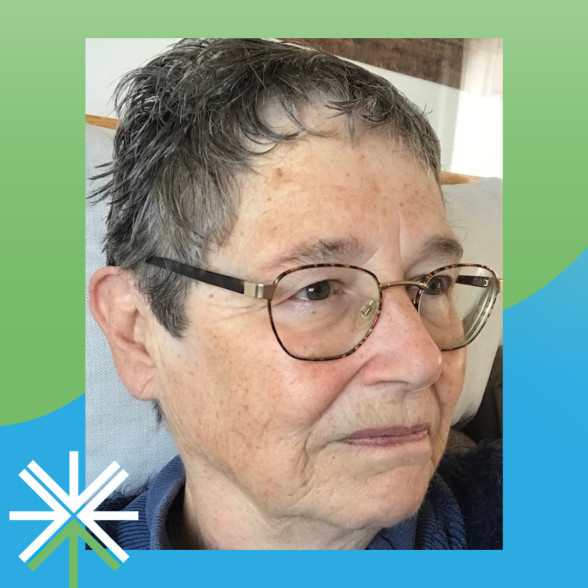My name is Maxine Linnell, and I live in Charnwood in Leicestershire, UK. I’m 75, and I was diagnosed with Alzheimer’s in September 2022.
If I was writing for a medic or a social worker or a support worker, they might already be making up a picture of me from what they already know of people with dementia. We all do it. We can’t help it. It might go something like this:
How is she writing this at all, if she has dementia?
How much is her future healthcare going to cost?
Is she going to be Difficult, or Incoherent, or Slow?
Who is her carer? And where is her carer?
What can I do for her? How can I help?
What does she want? When will she get to the point?
I don’t know what to say. It’s all so tragic.
Where is my list of resources and people to refer her to?
I’ve got another appointment soon.
I could do with a coffee.
I’m Maxine. Google me, and you’ll find that I’m a writer and a poet. I started writing a blog recently, based on the experience of coming into this new world of dementia. You’re welcome to visit.
A couple more Google pages through, and I’m an editor and I teach creative writing. If you go further, you might find references to me as a psychotherapist. I worked as a therapist and taught counselors and therapists, for almost thirty years.
Those are some of the labels I’ve had - they mostly name what I’ve done, which has been challenging and fulfilling too. There’s a bit of personal story to add. I am the mother of two; my son died suddenly in 2010, and my amazing daughter lives fairly close to me with her family. I live independently. I get a bit of help, but I enjoy living alone, and nobody else has to deal with the ways I’m finding to live with dementia.
I’m good at starting things, less good at following through and finishing. For now, I’m good with tech, and Alexa is invaluable to help me track through the days. I’m good with challenges and problem solving, and that’s helping me to plan and predict how life might be as dementia progresses. I’m good at adapting. I’m not good at asking for help. I can be outspoken, but some people might feel that’s overrated. When I’m interested and committed I get absorbed, and things do tend to happen. I’ve been shaped by some big things in my life, as I think most of us are.There have been a few lives inside this one. And now here’s a new life, just when I thought I could settle down.
It seems to me that we all have a picture of what dementia means, and most of us are frightened of it. Terrified, maybe. It’s a big package to deal with. By the time there was a diagnosis, I’d talked with friends about forgetting, and they’d assured me that they forgot too. There was a conspiracy: if we don’t admit there’s a problem, it doesn’t exist. Or it might go away. The elephant snoozed in the middle of the room. We almost warmed our feet on her. We didn’t know her memory was shot to pieces.
By the time there was a diagnosis, I’d given up teaching because it was too stressful. I didn’t know why. I tried to remember, then realised that words slipped away, and might reappear. Or not. But self-criticism didn’t help. Nor did others' corrections or attempts to ‘teach’ me.
I accept the diagnosis - I’ve seen the PET scan. But I don’t accept the package that goes with the diagnosis. I’m not what I remember. I’m not a coherent being with a clear and singular personality, so that being hasn’t disappeared. There’s much more to us than that. Even when I’m in later stages, I shall still be myself, at some core level. I hope others might take the trouble to listen in to who I will be then, in whatever way it can be expressed. I hope that can happen to all of us with dementia.
I can’t help forgetting, or losing my way, or not being organised. So I’m not going to give myself a hard time, or insist on searching out that missing word or memory. There’s no point in visualising the end stage every time a word goes out of the window. And there’s no point in chasing the memory with a butterfly net, trying to entrap it.
I’ve felt crushed by people assuming I have nothing to say except to ask for help. Even though I knew the stigma and I’m strong, I’ve still felt crushed. Our cultural relationship to dementia, our fears and our judgements, have a large responsibility for the level of dependence, anxiety and withdrawal that seem to come with it. I’m not convinced that our feelings of distress, anger, anxiety and grief are only symptoms. They seem reasonable, if we’re being treated as if we’re nobody any more.
The contact I have with others with dementia is enriching and empowering. I especially appreciate the DEEP Network, Reimagining Dementia and of course Dementia Alliance International. I’ll go on talking, writing and discovering about dementia. I’ll go on taking part in research, sitting on panels, talking, writing, listening and discovering.
Get Involved in DAI
